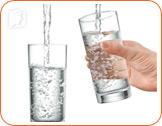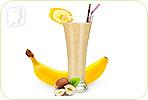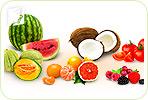
Menopausal weight gain can be stressful and have a negative impact on a woman's overall health. However, making sure to drink enough water - or eat enough foods that have water as a main ingredient - can help you become a healthier overall person. Drinking more water and replacing unhealthy beverages with water can also help a person to lose weight.
What Does Water Do?

Water is important for nearly every function that takes place in the human body, and 60% of the body is made up of water. This makes it important that everyone regularly consume foods and fluids that contain water.

If your goal is weight loss, water can help quell the thirst sensations that you may mistake for hunger pains. Research shows that thirsty people often turn to food instead of fluids because these body signals are closely related. If you're hungry, try drinking a glass of water, then wait. If you still have the urge to eat after a few minutes, you'll know for sure that you're craving food instead of fluids.
How Can Water Help with Weight Loss?

One can of soda contains 44 grams of sugar, so it is easy to see how drinking water instead of sugar- and calorie-laden beverages can help a person to lose weight. Many people also tend to snack on foods throughout the day while they are bored at the office or watching TV at home, even though this is not a healthy habit. Sipping water instead can help you stay active and lose weight. Here are some ways to jazz up your water-drinking habits:
- Drink water 15 - 20 minutes before every meal, which will help you to eat less at mealtime.
- Add ice that contains herbs like mint frozen into it.
- If you don't like the taste of water (or the lack thereof), squeeze in some lemon or lime juice.
- Add frozen or fresh diced fruit.
How Much Water Should I Drink Exactly?

Although there is no single recommendation for daily water consumption, eight glasses of eight ounces of water a day is commonly cited. However, the vast majority of people do not need to drink this much water every day. This is because water is also found in teas, juices, soups, and fresh fruits and vegetables such as cucumbers, watermelon, rhubarb, leafy greens, and citrus fruits. Eating these foods will help you get enough water and are also full of necessary nutrients. Daily water intake will also depend on your activity level and the climate in which you live.
More Information about Weight Gain
Menopausal weight gain usually involves excess fat accumulating around a woman's midsection. However, weight gain does not need to be an accepted or typical part of menopause. Regular exercise and a balanced diet can help prevent or reduce weight gain. If weight gain during menopause is troubling you or you are looking for guidance on how to maintain a diet and exercise routine, it is important to consult your doctor. Click on the following link to learn more about menopausal weight gain treatments.
Sources
- May Clinic Staff. (2014). Water: How much should you drink every day? Retrieved October 27, 2015, from http://www.mayoclinic.org/healthy-lifestyle/nutrition-and-healthy-eating/in-depth/water/art-20044256
- National Health Service UK. (2012). Can water or diet drinks aid weight loss? Retrieved October 27, 2015, from http://www.nhs.uk/news/2012/02February/Pages/water-helps-lose-weight.aspx



